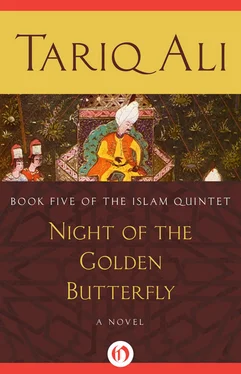On one occasion, as we were sitting at his table in the Café de Flore, a former acquaintance sauntered over towards us. Matho warned me: ‘He’s completely gone over to the ultras but for some unknown reason likes to pretend he’s still on our side, wallows in rubbishy nostalgia and has nothing to say. Please don’t encourage him to stay. I can’t stand his spindly legs walking in our direction.’
As long as Matho was alive, I would come often to Paris. I was stuck in deepest Fatherland without access to a computer or cell phone when he died fifteen years ago, and as a consequence I could not attend his funeral. After that I virtually stopped coming to this city. I missed him. I missed his sharp tongue, his energy, his vicious sense of humour and his refusal to surrender to the world in which we all lived.
Once, after an overlong New Year’s Eve supper — waiting for 1976—at his lover’s apartment, where too many bottles of red wine had already been consumed before the bubbles that greeted the New Year, I thought Matho was fast asleep and not listening to our conversation, knowing that he had the capacity to drop off whenever he felt intellectually exhausted. I’d forgotten that it was foolish to put too much faith in these naps, because as soon as he disagreed, which he did on hearing me discussing the events in Lisbon with his mistress, he would immediately wake up and resume the thread of the discourse taking place around him. That same evening, Matho opened his eyes and became genuinely irate when I confessed to the assembled party that I had never read any Stendhal. To make up for the faux pas I named the French novelists I had read and enjoyed, only to be brushed aside by him.
‘No need to flaunt your ignorance, my dear. Read him and I guarantee that you will love him. I don’t know the best English translations, but in French he’s without an equal. Zola is essentially a journalist; Proust is a self-indulgent genius; Balzac is, of course, brilliantly predictable; but Stendhal, he is something else. The way he unveils a struggle of ideas and the resulting emotions is masterful. An unwitting reader not fully able to grasp the writer’s mind suddenly begins to sympathize with a character whose radical beliefs are far removed from his own. Before he knows it he’s trapped. Happiness and misery are often related to the rise and fall of revolutionary politics. Read him, Dara. This is an instruction from the Committee of Public Safety.’
Thanks to Matho, I did exactly that and have never stopped. His books became the equivalent of an indispensable lover. They accompany me on all my travels. What is so wonderful about them is the way in which he breaks the rules, political and literary. He writes at an enviable pace and explains somewhere in one of his novels that ‘I write much better as soon as I begin a sentence without knowing how I should end it.’
Once I had read him he became regular fodder in my discussions with Matho, and new questions arose. Had Stendhal ever lain with a woman outside a brothel? I did not think so. His biographers failed to convince me of the opposite, but Matho became indignant at such a thought, even though he had no proof whatsoever. I was quite pleased to discover that the great novelist shared this lack of facility with my painter friend Plato.
As I dragged my suitcase in the direction of the taxi queue, I wondered what Stendhal’s refined intellect would have made of contemporary France, where the ultras he hated so much had recaptured official politics. The unrequited love that dominated his life and fictions was twined to memories of political passions and betrayed hopes. The sight of Paris, if you don’t live there, brings back all these memories.
Stendhal and Balzac had strolled along these streets, the latter puzzled as to how there could be not a single reference to money in La Chartreuse de Parme . Before them others had walked here, too, Voltaire and Diderot, Saint Just, Robespierre, and later Blanqui and the Communards, followed by Nizan, Sartre and de Beauvoir. It was the intellectual workshop of the world. Here the individual enterprises of philosophers and revolutionaries became part of a continuum that was certainly one side of the intellectual history of France. That is what makes the city precious for outsiders and exiles, even when times are bad. Those who love history must love Paris. Wander the streets late at night in the Quarter and linger over their nameplates; it’s a refreshing antidote to prevalent fashions.
Matho is no more, but his circle of friends still exists, a valiant minority of dissident publishers, intellectuals and workers who regularly and courageously challenge the established order and its mediacracy — men and women who live in a huge bubble, who are unable to account for themselves, and do not regard this in any way as a problem, who rarely question the sociohistorical realities that have produced them, not even when those realities erupt and threaten to bury their future in the lava.
I have maintained contact with many of the dissidents, all good people, but none of them can ever replace Matho. The question ‘Why fight back if nobody else does?’ always remained alien to him. Had he been alive I would have attempted to explain the reasons for this trip and he would have asked why I was going to dine with such an unusual lady from Fatherland and why she was staying at the Crillon, and I can read many other questions as if in your living eyes, Matho, old friend. Your absence has made you even more vivid and I can hear your music and your indignation very clearly.
To my surprise, she was waiting for me at the station, slightly overdressed and a bit tense. I didn’t immediately recognize her. It can’t be the woman I saw in London. She’s transformed. A haute couture trouser suit, makeup, immaculately cut and dressed hair and too much jewellery.
‘Dara!’
‘You should have warned me. Is it a fancy-dress dinner?’
‘Don’t be mean. Why should I spend the rest of my life mourning my past? I have a reasonable income because my only decent brother has a conscience. I’m free here to do as I wish. Don’t I have the right?’
‘That’s not a good question and never will be and you know that perfectly well. You look lovely.’
‘But you’re disappointed.’
‘Paris is always best after it’s rained a bit, the city is cleansed and the sky reverts to blue.’
‘You seemed preoccupied when I rang you. Who were you thinking of?’
‘Stendhal.’
My response triggered a memory and I laughed at myself. She insisted on sharing the joke, and realizing that her sparkling eyes and red lips would give me no rest, I told her. Once in Berlin, researching a novel soon after the Wall fell, I returned to my hotel and picked up a message to call Vera Fuch-Coady, an East Coast academic then in town working on Walter Benjamin’s radio broadcasts for children at the Wissenschaft College. I rang. She was obviously distracted. I asked whether I had disturbed her. I could ring back later. ‘No. Not at all. I’m not doing anything. Should we have dinner tonight?’ I agreed. She rang back a few minutes later.
‘Dara, you know when you rang a minute ago, I said I was doing nothing. This wasn’t exactly accurate. In fact I was thinking of Adorno. See you later.’
I was speechless, muttered something to the effect that I looked forward to seeing her soon and hoped she liked oysters, put the phone down and collapsed into laughter.
Zaynab smiled politely. ‘Who is Adorno?’
Mercifully a taxi became available at that moment. She seemed nervous, inwardly exasperated or scared. When I asked if anything was weighing on her spirits she described an episode that had taken place earlier that day. While walking in the Quarter and savouring the sunshine she was startled by the sight of a gang of policeman, who poured out of a van, surrounded an African, spread-eagled him against a wall, searched him, demanded papers that were not forthcoming and then bundled him into the van and drove away.
Читать дальше












